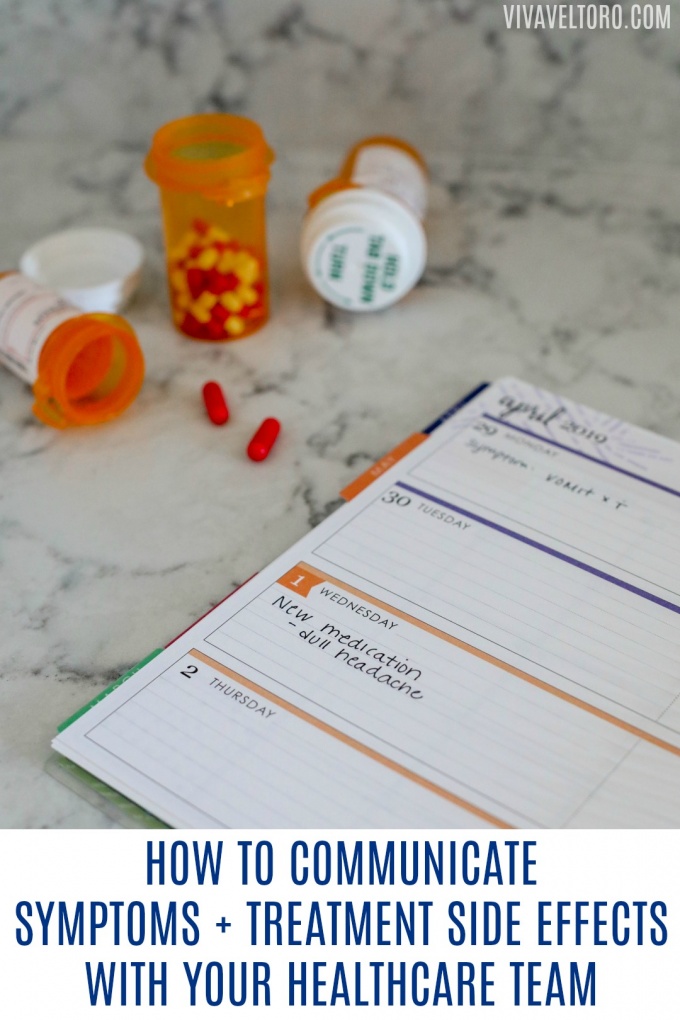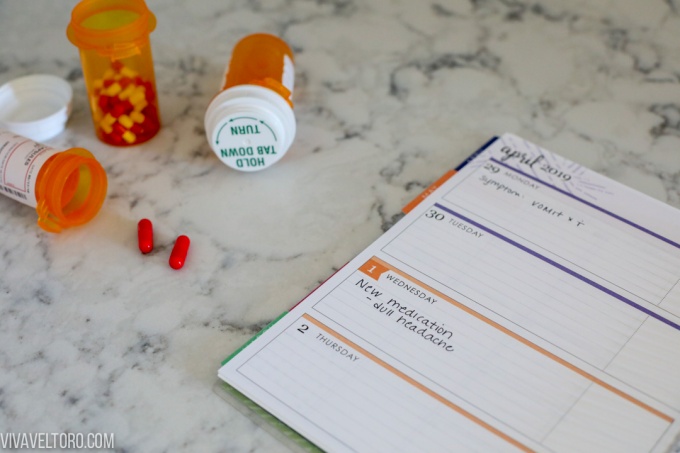This is a sponsored post. I was compensated by Med-IQ through educational grants from AbbVie, Astellas, and Genentech to write about communicating symptoms and treatment side effects with the healthcare team. All opinions are my own.

When I took a hiatus from nursing after my son was born, I was relieved. As a nurse practitioner, I took care of thousands of patients over the course of my career, many of whom were dealing with the devastating complications and side effects of cancer. Once I was at home with my new baby, I felt like I had finally put a pin in despair. But, as it often does, cancer slowly and pervasively found a way to seep back into my life. I would be scrolling through social media and see that a friend from high school had a new cancer diagnosis or receive a call that my friend's father was undergoing chemotherapy. That's why I wanted to work with Med-IQ to help raise awareness about the importance of reporting changes in symptoms and side effects to your healthcare team. Med-IQ empowers people at every level of the healthcare delivery system, from patients to physicians and everyone in between, with the knowledge they need to continuously improve outcomes. Whether you have cancer or you're supporting a loved one undergoing treatment, this is important information to hear.
As an Acute Care Nurse Practitioner, I took care of patients who were acutely ill in the hospital setting, mostly in the surgical intensive care unit at a large teaching hospital. One thing that I saw often was that patients carried journals with them. These weren't just the kind of journals where you poured your feelings onto paper for catharsis; these journals contained important information about treatment dates, medications, side effects, overall mood and well-being, and notes from doctor visits. To say they were priceless to the patients and enormously helpful to the medical team would be a huge understatement.
Recently, I provided a lot of details about how to manage cancer-related distress, but another really important topic relating to cancer is how to communicate effectively with your healthcare team. Since I have some insight into this topic, I wanted to give you some tips about how to relay information to your doctors and nurses and why it's so critical for your (or your loved one's) well-being.
Why do you need to report symptoms and side effects to your healthcare team?
You have to be an advocate when it comes to your health. Or, if you're the caregiver of a loved one with cancer, you need to be their voice. There may be times that you or your loved one might experience a sign or symptom that you don't know much about. Could this new manifestation be indicative of something serious looming, or is it a common side effect of the medication you've been prescribed? This is where your healthcare team can help. Your signs, symptoms and side effects can help guide your treatment. Perhaps you need additional imaging, or maybe you're just suffering from a common treatment side effect and you can get relief with a new medication.

How should you keep track of your symptoms and side effects?
As I mentioned earlier, a journal is a fantastic way to document your feelings, treatments, side effects, and symptoms. It doesn't have to be a traditional journal; it can even be an agenda or datebook. An agenda that has a calendar where you can document treatments and medications and then separate space for daily entries is ideal. Here, you can document your reactions and general feelings about treatments. Did you get an upset stomach after that medication? Did sores pop up in your mouth and how long have you been dealing with them? Your journal or folder should also include your diagnosis, the names of your healthcare providers, any medications you're taking, and the dosages.
If you can document things every single day you will have an accurate history to report to your healthcare team. Don't rely on your memory or give yourself false reassurance that you'll be able to remember things when they happen and you'll write signs and symptoms down later. Make it part of your daily routine to spend some time recalling the events of the day and anything new that happened or new symptoms that have arisen.

There are also free tools that you can print at home or use online to help with tracking. The American Cancer Society has several helpful tools to help you monitor chemotherapy or radiation side effects, pain levels, and medications.
One important thing to note about medications is that you should not add supplements or over-the-counter (OTC) medications to your regimen without discussing it with your healthcare team. Some people wrongly assume that an OTC medication or vitamin will be fine to take, but these medications can interact with your cancer medication and cause serious problems. Be sure to talk to your doctors, nurses, and pharmacist before starting anything new.
When should you contact your healthcare team about symptoms and side effects?
Some side effects or symptoms may be easily managed at home, but there are some symptoms that require immediate attention. Ask your healthcare provider about which side effects you might experience with your specific treatment plan. Ask them if they have a list of side effects or symptoms that you should report right away. Also, ask about how you can reach your healthcare team after hours.
Though your team may have more specific guidelines, in general, the National Comprehensive Cancer Network gives us some examples of side effects that may warrant immediate care:
- A fever of 100.5°F or higher
- Difficulty breathing
- Increased pain
- Trouble swallowing
- Confusion
- A new rash
- Uncontrollable diarrhea
- Swelling in the legs or arms
- Bleeding
Are you currently dealing with cancer as a patient or caregiver?
Med-IQ would love to hear from you.
Med-IQ is currently running a survey and they would love your input. The anonymous survey, which includes more education on this topic, will take less than 15 minutes to complete. No personal information will be kept, sold, or stored in the survey completion process and results will only be shared in aggregate.
CLICK HERE TO TAKE THE SURVEY.
Disclaimer: Thank you to Med-IQ for sponsoring this discussion. Links to external sites are provided as a convenience and for informational purposes only. They are not intended and should not be construed as legal or medical advice; nor are they endorsements of any organization. Med-IQ bears no responsibility for the accuracy, legality, or content of any external site. Contact the external site for answers to questions regarding its content.


Leave a Reply